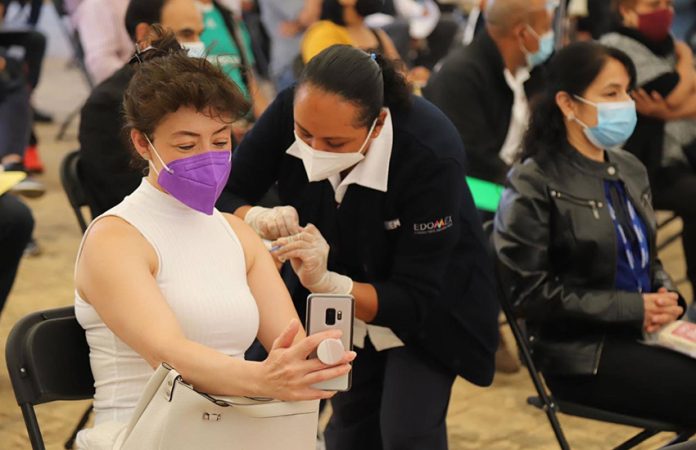People aged 40-49 can now register for vaccination against Covid-19 and will likely receive their first shot in June.
The government’s online registration platform opened to people in that age bracket on Thursday. In order to register, Mexicans and foreign residents must enter their CURP identity number.
People are then directed to click on a tab that reads “Quiero vacunarme” (I want to get vaccinated.)
After providing their personal details, including their full address, telephone number and email address, registrants will be issued a digital receipt with a unique file number. The government recommends that people download and print their receipt and take it with them when they go to an official vaccination center.
Those who register on the government site are supposed to be contacted by health authorities to advise them when and where they will be vaccinated. However, in many cases there has been no direct notification and local governments have used social media instead to get the word out.
President López Obrador said last week that vaccination for those aged 40–49 would commence in July but now the government says it will begin in the first week of June.
Just over 28.5 million vaccine doses had been administered to seniors, health workers, teachers, pregnant women and people aged 50–59 by Thursday night, according to federal data. At the Health Ministry’s coronavirus press briefing, Director of Epidemiology José Luis Alomía highlighted that a daily record of 763,667 shots were administered on Wednesday.
Mexico has used the Pfizer, AstraZeneca, Sputnik V, CanSino and SinoVac vaccines and has received 37.76 million doses of those vaccines, of which approximately 75% have been used.
Deputy Health Minister Hugo López-Gatell announced Thursday that health regulator Cofepris has also granted emergency use authorization to Johnson & Johnson’s single-shot Covid-19 vaccine. However, there is no immediate plan to purchase that vaccine, the coronavirus point man said.
“We have a decent supply with the other five vaccines,” López-Gatell said at the Health Ministry news conference. He also said that as many as 2 million Mexicans might travel to the United States to get vaccinated but emphasized that there were no formal estimates.
Many wealthy Mexicans have already been inoculated in the U.S., where vaccines are more readily available. More than 290.7 million vaccines have been administered in the U.S. for a rate of 88 shots per 100 people, according to The New York Times vaccinations tracker. The per capita rate in Mexico is four times lower at 22.
Meanwhile, Mexico’s coronavirus case tally rose to 2.4 million on Thursday, and the official Covid-19 death toll increased to 222,661, a figure considered a vast undercount.
Mexico’s coronavirus situation has improved considerably since the start of the year when the second — and worst — wave of the country’s outbreak peaked. Half of Mexico’s 32 states are currently low-risk green on the federal government’s coronavirus stoplight map, 15 are medium-risk yellow and just one, Quintana Roo, is high-risk orange.
